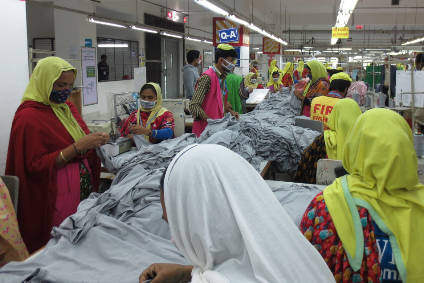
A swingeing 32.8% hike in the average price of natural gas in Bangladesh from 1 July has stoked anger among clothing and textile manufacturers, producers and trade unions, raising concern it could damage the competitiveness of their US$34bn industry.
Mohammad Ali Khokon, president of the Bangladesh Textile Mills Association (BTMA), says of the rise, which was made by the Bangladesh Energy Regulatory Commission: “How can a 40% gas price increase [for industries] be justified?”

Discover B2B Marketing That Performs
Combine business intelligence and editorial excellence to reach engaged professionals across 36 leading media platforms.
Indeed, many of his members will pay more, with an especially high rise for bills paid by in-house power plant operators, for whom charges rose by as much as 44%. Most Bangladesh textiles units rely on captive power plants.
Khokon says the gas price hike will push up production costs, blunting the competitive edge of a sector that, with the clothing sector, employs around 5 million workers: “We’ll lose the market,” the BTMA chief told just-style.
Garment industry leaders share similar concerns. Dr Rubana Huq, president of the Bangladesh Garment Manufacturers and Exporters Association (BGMEA), estimates that the 38% hike for general industrial gas consumption will increase her members’ overall costs by around 1% – gas bills accounts for at least 1.5% of clothing manufacturing expenditure.
“This may not sound much in terms of percentage, but for an industry struggling for every penny this will be another blow,” she says.

US Tariffs are shifting - will you react or anticipate?
Don’t let policy changes catch you off guard. Stay proactive with real-time data and expert analysis.
By GlobalDataClothing and textile labour unions are also unhappy, saying a 23% spike in bills for domestic usage will directly hit workers. Salauddin Shapon, secretary-general of the IndustriAll Bangladesh Council (IBC), says furthermore, the decision will pile pressure on factory owners to trim wages at a time when clothing product prices are falling.
“This will be beneficial for none. If owners are under pressure, its impact will fall on the workers,” he warns.
“If we want to see the industry progress and consider the well-being of people, the government should bring the gas price back to the previous level,” he told just-style.
Protests have erupted over the price increase, with left-leaning parties seizing the ministry of energy and mineral resources on Sunday (14 July) after organising a half-day strike a week earlier.





